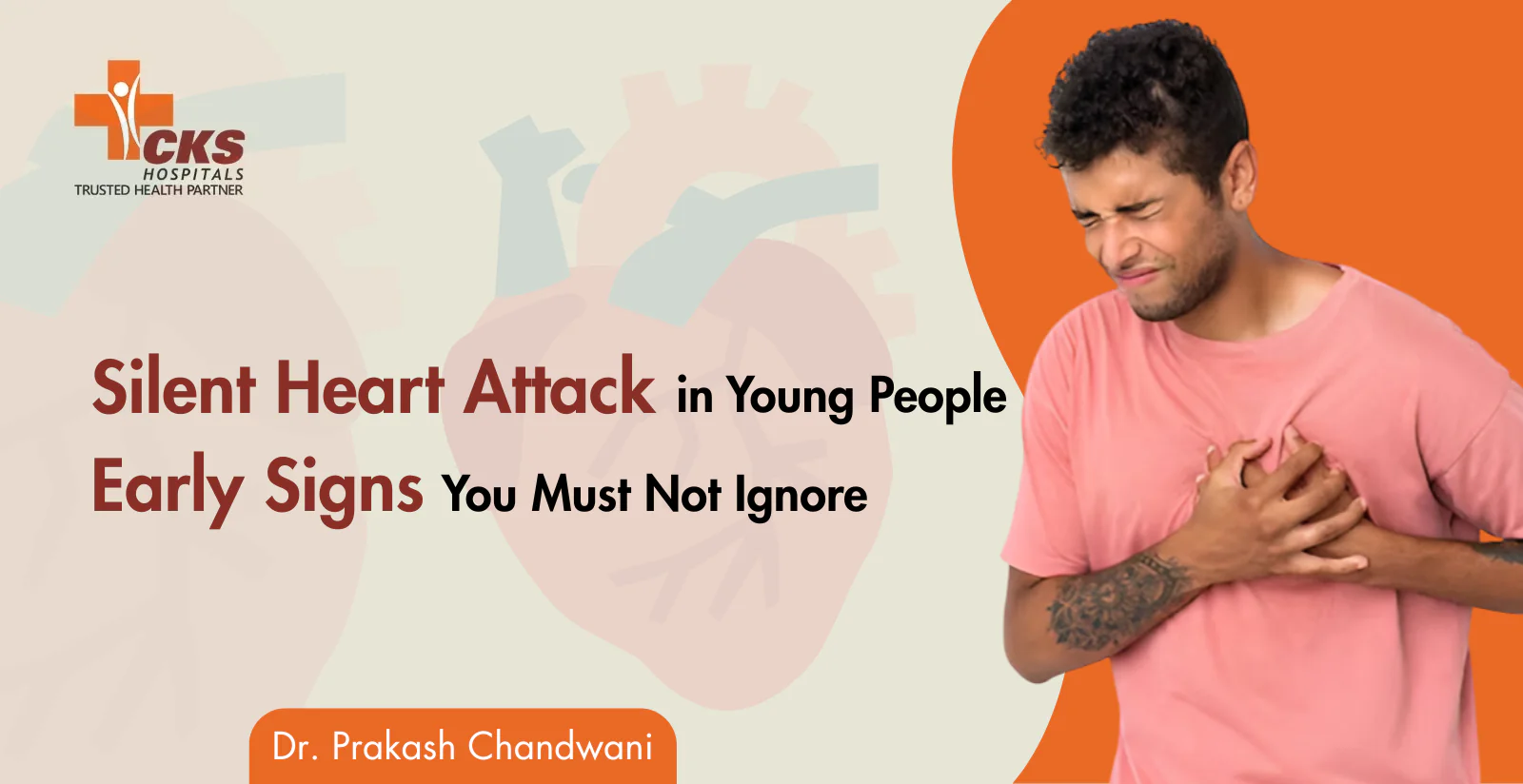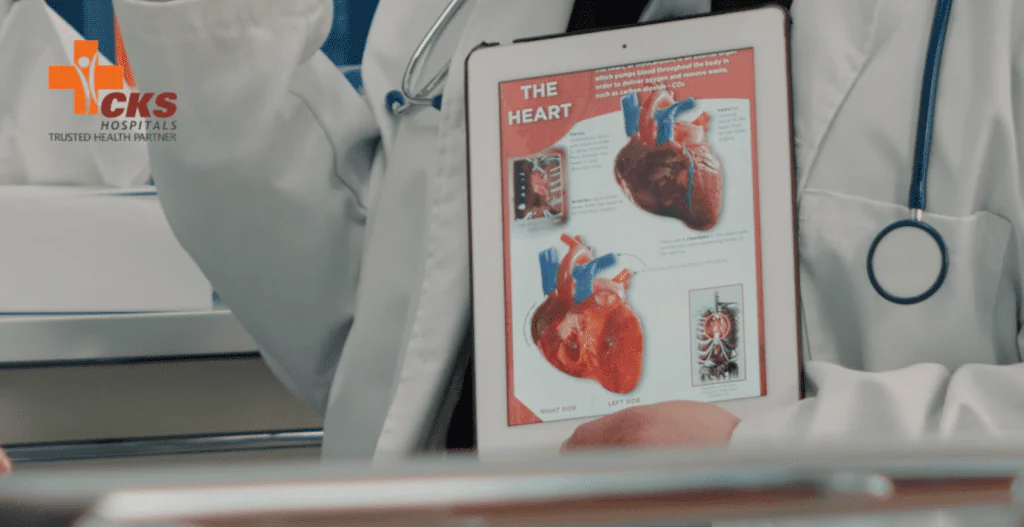
Silent Heart Attack in Young People — Early Signs You Must Not Ignore
Introduction: A Wake-Up Call for the Young Heart
Heart attacks are not an issue that occurs among elderly people. Over the past few years, physicians in India have observed an alarming pattern in regard to the increasing cases of heart attacks in youth, particularly those in the age group of 25–40. This unexpected twist has caused the authorities to reconsider the way we are living our lives and the toll stress is taking on our hearts. If you or your loved ones are at risk, early heart attack treatment can make a life-saving difference.
One of the most dangerous types of a heart attack is a silent heart attack as it may not be accompanied by typical symptoms of a heart attack. No intense chest pains, no obvious precautionary detection. But, within the body, the heart is also being destroyed at a slow and silent pace.
This article will allow you to know about the silent heart attack, its symptoms, and how to save your heart before it is too late.
What Is a Silent Heart Attack?
A silent heart attack occurs when blood supply to a section of the heart is interrupted, and the patient does not experience the characteristic sharp pains in the chest that most victims of a heart attack experience. Owing to this, so many individuals are not aware that they have had one till later on.
During an ordinary heart attack, individuals tend to experience a lot of pain or pressure in the chest, extending to the arm or the shoulder, and may collapse or develop a faint feeling. In a silent heart attack, however, the symptoms are mild or quite confusing e.g. tiredness, indigestion, or some slight degree of discomfort that individuals overlook.
It is perceived as silent but the symptoms are not loud or clear. You might have dull chest pains that disappear as opposed to acute ones. Yet, despite the fact that the symptoms are silent, the destruction of the heart is true and severe. In case they remain untreated, the heart muscles may get weak and this later can result in serious heart issues.

Why Are Young People at Risk Now More Than Ever?
Heart attacks previously were mainly experienced by individuals over 50 years. However, currently, doctors are observing an increase in the number of young adults admitted with heart-related issues. This shift can be attributed to several factors—a majority of them being attributed to the change in lifestyles that have occurred.
Here are the main causes:
- Stress and anxiety that are chronic: Many of the youths suffer work or school stress. It is known that the hormones of stress make the blood pressure and heart rate up and damage the heart during the experience.
- Sleep deprivation: Late work and phone time as well as poor sleeping patterns make the heart weaker and the body more fatigued.
- Balanced diets: In the modern day, fast food, fried food sources, and sweeteners are the way of living. These are the foodstuffs that increase the bad cholesterol and block arteries.
- Vices that are bad: Drinking and smoking damage blood vessels and put a person at risk of heart diseases.
- Lifestyle: Long sitting may be associated with the augmented period spent on the desks or phones in place of the exercises leading to obesity and ineffective blood circulation.
- Effects of COVID-19: People who have COVID-19 may experience inflammation of the heart, as a result of which they are more susceptible.
Contemporary life has been made to be very hectic and demanding. The ongoing stress to give an excellent performance, whether at the workplace, in school, or even on social media, has added pressure on the hearts of young people. What brings the risk even further is the fact that many people neglect early symptoms and assume that they are too young to have heart difficulties.
Early Warning Signs You Shouldn’t Ignore
Sometimes silent heart attacks do not include the dramatic fall or sudden pains. The body instead sends little messages which a person confusingly takes to mean ordinary fatigue or stress. However, such minor clues can frequently be the means of the body to request assistance. If you experience these symptoms, it’s important to seek medical advice from Dr. Prakash Chandwani, an experienced Heart Doctor in Jaipur, for timely evaluation and care.
Symptoms that you are supposed to be vigilant on are:
- Chest pain (mild or pressure): There must be an estimation of bulk or constriction of the chest.
- Abnormal fatigue, or weakness: When there is a feeling of extreme tiredness, although you had a rest, this would be a warning that your heart is not pumping properly.
- Narrowness of the chest: You can relate it to your heart when you experience shortness of breath when performing basic things like walking up the staircases.
- Nausea or indigestion: This may be considered as a simple case of acid or gas, but can be a symptom of a heart problem.
- Pains on the jaw, the neck, and the shoulders: It is possible that these are the residue of a silent heart attack especially among women.
- Dizziness or cold sweats: Feeling light-headed or having a cold sweat not as a result of exertion may be as a result of decreasing the flow of blood.
- Irregular heartbeat or anxiety attack: The beating of the heart, palpitations or the feeling of apprehension though the cause is not evident may be a heart rhythm disorder.
The thing is that one should keep in mind that the symptoms may be different in men and women. Women usually complain of back pain, sickness, or fatigue as opposed to chest pain.

How to Detect a Silent Heart Attack
A significant amount of silent heart attacks is only revealed during a health check-up or through the conduction of a test by the doctor due to some other reason. That is the reason why regular health checks are significant, particularly after the age of 25.
Some of the ways through which heart problems can be detected at an early stage include:
- ECG (Electrocardiogram): It is a test to find out the electrical activity of the heart and indicate whether or not there has been some silent damage.
- Troponin test: It is a test that examines the level of certain enzymes in the blood which increase when the heart muscle is damaged.
- Echocardiogram (Echo): This is a test that involves use of sound to produce images of the heart and how it is functioning.
- Stress test: Doctors put your heart to the test to find out how it reacts to exercise, and this can be a warning of an underlying issue.
- Smartwatches and fitness bracelets: Most of them today include a heart rate and rhythm tracker that will notify you of an irregularity.
When you are in pain, out of breath, or weak, take no time to get to the point of extreme pain. Visit a doctor immediately. It is not too late to save your life.
Prevention: Protecting Your Heart Before It’s Too Late
The positive aspect is that even the silent attacks of the heart are not deadly and could be avoided with the appropriate lifestyle habits. Heart-healthy living does not imply tremendous transformations; even minor daily routines can produce tremendous outcomes.
Lifestyle Changes:
- Have a heart diet: Eat nuts, fruits, vegetables, oats, and olive oils. Eliminate fried and processed foods.
- Work out on a regular basis: Simply 30 minutes of walking, cycling, or yoga at least five days a week would maintain your heart fit.
- Reduce stress: Think of meditating, journaling, or just talking to your loved ones. Avoid holding in emotions.
- Sleep: Take 7–8 hours of restful sleep daily to ensure that your heart rests at night.
- Stop smoking and drinking alcohol intake: These are considered as some of the most prominent causes of heart damage.
- Get check-ups regularly: Despite feeling good, ensure that you check your blood pressure, sugar, and cholesterol levels annually.
Medical Prevention:
- Check your vitals: Check your blood pressure, sugar, and cholesterol.
- Avoid self-treatment: It is dangerous to take painkillers or other medications without consulting a doctor, as it may damage the heart.
- Family history awareness: When your parents or other family members have heart disease, you need to seek the services of a cardiologist as soon as possible.
By changing them today, you will increase your chances of beating a heart attack case in the next day without sound.
Real-Life Story: A Lesson in Listening to the Body
There was a case of an IT professional of Jaipur, aged 32, not paying sufficient attention to weeks of tiredness and mild chest pains, believing that it was due to exhaustion at his workplace since he was working long hours. One day, after the general check-up, his ECG revealed some kind of evidence of a past silent heart attack. He was not even aware that it had occurred.
With proper and prompt therapy and change of lifestyle, he bounced back. His story demonstrates how bad it could be to disregard minor symptoms. Silent heart attacks tend to murmur before they hit. The first step of saving your life is to listen to your body.
Some heart specialist once remarked that your heart does not speak but its communication is in signals. The faster you hear, the more time you have to live.
Conclusion: Listen to Your Body Before It’s Too Late
Silent heart attack is a type of heart attack with no noises but has severe effects. The symptoms that include fatigue, slight discomfort, or lack of breath are not the symptoms that seem harmless. Failure to pay attention to them may result in permanent damage to the heart.
The youth have to be made aware of the fact that the heart issues do not wait until they are old to strike. Even young adults that appear healthy have been put at risk by modern stress, unhealthy food habits, and lack of exercise. For timely diagnosis and expert care, consult Dr. Prakash Chandwani, an experienced Cardiologist in Jaipur to keep your heart health in check.
Remember:
- Listening to small messages that your body sends you is not to be ignored.
- Get regular heart check-ups.
- Live a better, healthy life—eat better, move better, and sleep better.
The life engine of your body is your heart. Take good care of it and it will take good care of you in years to come. It is up to you today, how you act, whether or not your heart will be great tomorrow.

